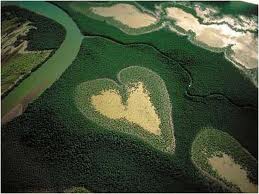Enlightenment...but not in America, in America Nature & Animal remain 'resources' to exploit.
What is “Right’s of Nature”?
“Rights of Nature is the recognition and honouring that Nature has rights. It is the recognition that trees, oceans, animals, mountains have rights just as human beings have rights. Rights of Nature is about balancing what is good for human beings against what is good for other species, what is good for the planet as a world. It is the holistic recognition that all life, all ecosystems on our planet are deeply intertwined. “ Source
Ecuador Adopts “Rights of Nature” in Their Constitution
“Ecuador is the first country to recognize Rights of Nature in its Constitution. A great first step for humanity towards a change of paradigm! Ecuador is home to the Galapagos Islands, Andean Mountains and Amazon rainforest as it is a geologically, ecologically and ethnically diverse country
Ecuador rewrote its Constitution in 2007-2008 and it was ratified by referendum by the people of Ecuador in September 2008.
The new Ecuadorian Constitution includes a Chapter: Rights for Nature. Rather than treating nature as property under the law, Rights for Nature articles acknowledge that nature in all its life forms has the right to exist, persist, maintain and regenerate its vital cycles. And we – the people – have the legal authority to enforce these rights on behalf of ecosystems. The ecosystem itself can be named as the defendant.” Source
To download a PDF file of the constitutional changed declared by Ecuador, click hereSee the entire “Universal Declaration Of Rights Of Mother Earth” here
The Law of Mother Earth: Behind Bolivia’s historic bill
** Please note that this bill was passed on the 22nd April 2011 which was Earth Day**“Indigenous and campesino (small-scale farmer) movements in the Andean nation of Bolivia are on the verge of pushing through one of the most radical environmental bills in global history. The “Mother Earth” law under debate in Bolivia’s legislature will almost certainly be approved, as it has already been agreed to by the majority governing party, Movimiento Al Socialismo (MAS).
The law draws deeply on indigenous concepts that view nature as a sacred home, the Pachamama (Mother Earth) on which we intimately depend. As the law states, “Mother Earth is a living dynamic system made up of the undivided community of all living beings, who are all interconnected, interdependent and complementary, sharing a common destiny.”
The law would give nature legal rights, specifically the rights to life, regeneration, biodiversity, water, clean air, balance, and restoration.
The law would give nature legal rights, specifically the rights to life and regeneration, biodiversity, water, clean air, balance, and restoration. Bolivia’s law mandates a fundamental ecological reorientation of Bolivia’s economy and society, requiring all existing and future laws to adapt to the Mother Earth law and accept the ecological limits set by nature. It calls for public policy to be guided by Sumaj Kawsay or Vivir Bien (an indigenous concept meaning “living well,” or living in harmony with nature and people), rather than the current focus on producing more goods and stimulating consumption” Source
The Law of Mother Earth includes the following;
- the right to maintain the integrity of life and natural processes
- the right to not have cellular structure modified or genetically altered
- the right to continue vital cycles and processes free from human alteration
- the right to pure water
- the right to clean air
- the right to balance, to be at equilibrium
- the right to be free of toxic and radioactive pollution
- the right to not be affected by mega-infrastructure and development projects that affect the balance of ecosystems and the local inhabitant communities
Turkey Is Now Debating An Ecological Change To Their Constitution.
22nd May 2011 - “We are just starting a campaign calling for an ecological constitution,” said Turkey’s Green Party spokesperson Ümit Sahin, who is among 40 people including politicians, academics, and lawyers involved in the Initiative for an Ecological Constitution (IEC). “As Turkey has been talking about making a new constitution, which is supposed to value the individual, then we should be talking about an ecological approach to it,” Sahin said, adding that their role models are Bolivia and Ecuador, which understand the value and rights of Mother Earth. The IEC believes in this approach of the Latin American states, he said, because neither the European states nor the United States have been able to fully address the issue even though there are some examples like France, which has a Green Charter, and some states in the US, which have been adopting ecologically sensitive laws. Source















2 Comments:
Step by step...now there,someday everywhere.
Post a Comment